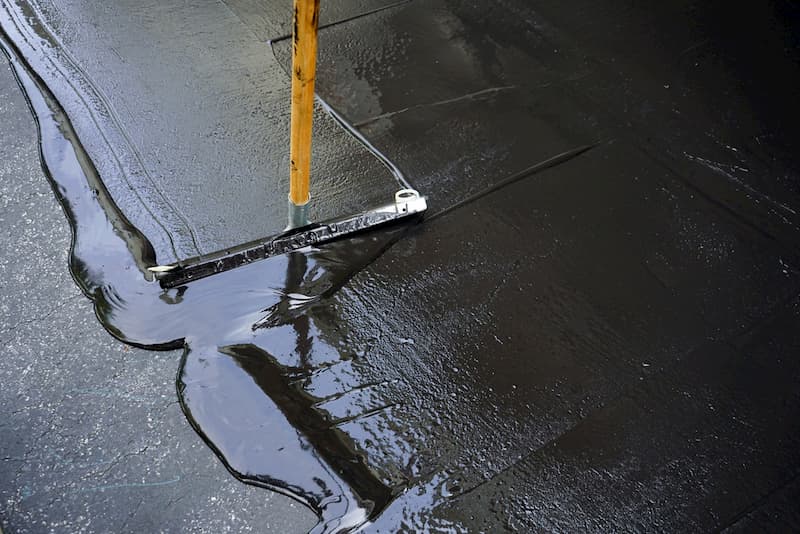Grasping Tilted Parking: How Asphalt Sealing Boosts Industrial Lots
Wiki Article
Hot Mix Asphalt: A Sustainable Service for Pavement
Hot Mix Asphalt (HMA) has actually arised as a leading sustainable selection for pavement remedies, providing a myriad of environmental advantages and innovative modern technologies. Its capability to lower and reuse products energy usage provides an engaging situation for its fostering in road building jobs. The long-lasting performance and resilience of HMA make it a preferred choice for infrastructure advancement. As the need for environmentally friendly building practices grows, discovering the subtleties of HMA's sustainability can provide beneficial insights into the future of sidewalk solutions.Ecological Advantages of Hot Mix Asphalt

In Addition, Warm Mix Asphalt assists to mitigate urban warm island results. Its dark shade takes in sunshine, decreasing the quantity of warmth mirrored back right into the environment compared to lighter-colored sidewalks. This can reduce ambient temperature levels in city locations, lowering the need for cooling and eventually reducing energy usage.
Furthermore, Warm Mix Asphalt contributes to enhanced stormwater management. Its permeable nature permits water to penetrate the sidewalk and reenergize groundwater supplies, lowering runoff and the threat of flooding. These environmental advantages make Hot Mix Asphalt a lasting choice for paving roads and highways.
Power Effectiveness in HMA Production
Is power efficiency a critical consider the production of Warm Mix Asphalt (HMA)? Absolutely. Energy plays a considerable role in the production of HMA, impacting both cost and environmental sustainability. One essential element of power efficiency in HMA production is the use of cozy mix asphalt (WMA) innovations (commercial parking lot paving). WMA enables for the blending and placement of asphalt at reduced temperature levels compared to traditional warm mix asphalt, leading to lowered energy usage throughout production. This process not only decreases fuel use however likewise reduces greenhouse gas exhausts, making it a much more eco-friendly alternative.Moreover, innovations in plant modern technologies have actually caused more energy-efficient HMA production processes. Modern plants are designed with functions like recycled asphalt pavement (RAP) processing abilities, effective burner systems, and boosted insulation, all adding to power financial savings. By optimizing energy use in HMA manufacturing, the industry can decrease its carbon impact while preserving high-grade pavement materials. Energy efficiency is, therefore, a vital consideration in making sure the sustainability of Hot Mix Asphalt production.
Recyclability of Warm Mix Asphalt
The recyclability of Warm Mix Asphalt (HMA) is an essential aspect of its sustainability and lasting environmental impact. HMA is among one of the most recycled materials in the USA, with over 100 million tons of redeemed asphalt sidewalk (RAP) being recycled every year in brand-new pavement building. Recycling HMA provides several from this source environmental advantages, such as minimizing the requirement for virgin materials, lowering power intake throughout production, and lowering the amount of waste sent out to land fills.The procedure of recycling HMA includes milling the existing pavement, crushing it into smaller pieces, and blending it with brand-new aggregate and asphalt binder to develop a recycled mix. This recycled mix can typically carry out along with or perhaps better than standard HMA, while calling for fewer raw materials and producing lower greenhouse gas emissions. By integrating RAP right into brand-new sidewalk jobs, roadway agencies can save natural deposits, minimize prices, and decrease the environmental impact of road building and construction and maintenance tasks. Generally, the recyclability of HMA plays a significant role in advertising lasting methods within the pavement industry.

Long-Term Performance of HMA
Asphalt sidewalks show toughness and durability over a prolonged duration, showing the lasting efficiency of Hot Mix Asphalt (HMA) The durability of HMA can be credited to its capability to withstand rush hour tons, rough climate conditions, and the results of aging. Studies have actually revealed that properly designed and effectively built HMA pavements can last for two decades or even more with normal upkeep. The secret to maximizing the lasting efficiency of HMA exists in using high-quality products, adhering to finest practices in construction, and implementing effective maintenance techniques. Correct water drainage, regular evaluations, and timely repair work are vital for preserving the structural integrity of HMA pavements in time. Additionally, advancements in HMA modern technology, such as making use of polymer-modified binders and warm mix asphalt, have actually try this out additionally enhanced the resilience and longevity of HMA pavements. By prioritizing high quality building and construction and maintenance techniques, HMA continues to verify itself as a affordable and lasting option for resilient pavement facilities.
HMA: Toughness and Sustainability
Showing both toughness and sustainability, Hot Mix Asphalt (HMA) has actually become a foundation in the construction of resilient pavement frameworks - angled parking. HMA's resilience stems from its ability to stand up to hefty lots, harsh climate condition, and high website traffic volumes, making it a dependable selection for highways, freeways, and airport terminal paths. The composition of HMA, which normally includes accumulations, binder, and filler, plays an essential function in enhancing its longevity and resistance to tear and wear
In addition, HMA's sustainability exists in its recyclability and energy-efficient manufacturing process. The capability to recycle redeemed asphalt sidewalk (RAP) in new HMA blends lowers the need for virgin products and reduces the environmental influence of sidewalk building and construction and upkeep. In addition, the energy efficiency of generating HMA depends on its reduced mixing temperatures compared to other sidewalk products, leading to minimized power usage and greenhouse gas exhausts.
Conclusion
see it hereIn verdict, warm mix asphalt (HMA) provides a sustainable solution for sidewalk with its ecologically pleasant features. HMA's recyclability, power efficiency in production, and lasting durability make it an eco-friendly option for road building and construction. By preserving all-natural sources, reducing waste, and lowering greenhouse gas discharges, HMA plays a crucial duty in promoting sustainability in facilities growth. Its capacity to alleviate city warmth island effects additionally highlights its relevance in developing eco conscious and durable sidewalk systems.
HMA is one of the most recycled materials in the United States, with over 100 million tons of reclaimed asphalt pavement (RAP) being reused every year in new sidewalk building and construction.The process of reusing HMA includes milling the existing sidewalk, squashing it right into smaller sized pieces, and mixing it with new accumulation and asphalt binder to develop a recycled mix.Asphalt sidewalks demonstrate toughness and strength over an extended period, showing the long-term performance of Hot Mix Asphalt (HMA) Furthermore, developments in HMA technology, such as the usage of polymer-modified binders and cozy mix asphalt, have actually even more enhanced the sturdiness and longevity of HMA pavements. The ability to reuse reclaimed asphalt sidewalk (RAP) in new HMA mixes lowers the demand for virgin materials and decreases the ecological effect of pavement construction and maintenance.
Report this wiki page